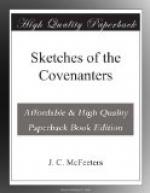The high ideal for nations entertained by the Covenanters of Scotland will hardly be excelled while the world lasts. The Lord gave them a vision of what their country should be: enlightened with the Gospel, governed in righteousness, protected by Omnipotence, adorned with churches, a school in every parish, and a college in every city. The land in that vision was married to the Lord—Beulah was her name. All destroying vices had fled, all public evils were rooted out. The heavens were beneficent, the soil yielded its increase, business was prosperous, the armies were victorious, the rulers were God’s ministers, the homes were filled with peace and plenty, and resounded with the melody of praise. Such was their conception of the blessed nation whose God is the Lord.
[Illustration: Rutherford in prison.
Samuel Rutherford was a devoted minister and faithful Covenanter. He had charge of a congregation at Anwoth, from whence he was driven by persecution. For a time he was compelled to abide in Aberdeen. Here he wrote the famous “Letters” that sparkle like rubies, with precious thoughts. Out of his heart flowed “rivers of living water.” Such spirituality is seldom seen in mortals. His enemies sought his life, yet God permitted him to die on a peaceful deathbed. A vision of heaven seemed to break upon his soul in his last moments, and he died, exclaiming, “Glory, Glory in Immanuel’s land.”]
All this was embodied in the Solemn League and Covenant. By analyzing that international bond we find that it expresses or implies the following:
Nations originate with God, are dependent on His will, subject to His authority, and accountable at His throne.
They are placed under Jesus Christ to be employed by Him to the glory of God the Father.
The chief end of Civil Government is to suppress wickedness and promote righteousness, and thus prepare the way for the coming of the kingdom of our Lord.
Civil rulers are God’s ministers, and as such, should serve the Lord Jesus Christ by conserving true religion.
Civil rulers should be interested in the union of the Churches, in Doctrine, Worship, Discipline, and Government, according to the Scriptures.
Civil Government should suppress in Church and State all features of society that are openly criminal or publicly injurious.
The people should enter into a solemn Covenant with their rulers and with God, to place themselves and their possessions in readiness to sustain the government in its legitimate work.
The nation that keeps Covenant with God shall dwell in safety, grow in power, and enjoy enduring prosperity.
Such was the Solemn League and Covenant.
Have the principles of Civil government ever had an enunciation so candid and heroic, so sublime and comprehensive, so ennobling to man and honoring to God? These principles were not flashes of a high-wrought imagination; they were practical. The Covenanted fathers reduced them to practice. These nations embodied them. The time was short, yet long enough for a demonstration.




